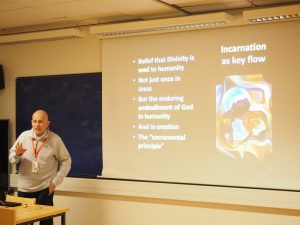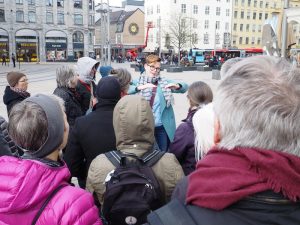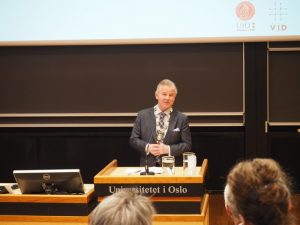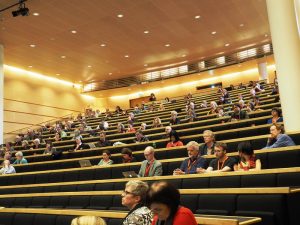2017 Oslo
IAPT Conference 2017 – Reforming: Space, body, and politics.
Conference of the International Academy of Practical Theology (IAPT)
April 20 – 24, 2017 Oslo, Norway
The host institutions were the Faculty of Theology at the University of Oslo, MF Norwegian School of Theology and VID Specialized University.
PROGRAMME
Click here to download the program
ABOUT the THEME
The IAPT biennial conference in 2017 is located in Oslo, in the peaceful and wealthy Nordic welfare state. How are we to do practical theology when the everyday – and the global – are part of reforming processes, both spiritual, social and cultural? With 500 years of Reformation as an important Nordic context, are there reforming experiences and values to learn – and unlearn? The topic Reforming: Space, body, and politics guides all aspects of the conference program: the keynotes, roundtables and plenaries as well as the paper sessions. While we call for the exploration and critical discussion of these three notions as a set of key concepts for practical theology in this moment of time, we are also interested in their relevance for how practical theology as a discipline might be reformed.
Space: Migration and beyond
There are many spaces that reform contexts, churches and societies today. One obvious case among all of them is migration. This is a case of demanding space, giving up space and reclaiming new spaces. At the same time migration constructs spaces that reform religion, theology and churches. We look for papers on migration as well as other cases that deal with ways in which religion contributes, increases and decreases spatial identities, belongings and citizenship.
From a research perspective migration is part of the transnational migration and religion studies where one does not look at migration and mobility as the strongest normative challenge ever, but as part of ordinary life. The discussions on migration and space need to pay attention to these important traditions, first of all because they do not share the more popular position that migration is a strong normative challenge for “us”.
Being aware of such a transnational context, there is no doubt that the present and probably ongoing refugee mobility from the South and the South-East needs to be addressed as an important context for the conference. Both practical theological case studies and more systematic (spatial) thinking on these issues are welcomed.
A decisive perspective in the post-colonial reflection is not to view the colonized any more as victims, but as people with agency and in their full right to frame their own life, belonging and future. Then the practical theological questions will be both the kind of advocacy and the kind of practice coming out of the post-colonial turn in this field. This might also lead to interesting discussion on whether post-colonizing the North also is a very relevant approach in this context.
We particularly welcome papers that address the issue of reforming space with a special emphasis on migration as a case, but also papers relating reforming space more broadly to practical theology:
• How can spatial approaches lead to reforming interpretations of religion, churches and practical theological interpretations?
• How can concrete spatial practices lead to reforming ecclesiologies?
• How can religiously founded spaces reform politics?
• How can spaces combine both secular and religious practices?
Reforming the body, reforming the church
Embodiment is increasingly anticipated as a source of theology. In bodily actions and interactions, theological as well as cultural concepts and norms are enacted and these enactments may be the primary access to what a church, a congregation, a neighbourhood, or a family is. The relationship between bodily actions and norms is vividly clear in the voices of bodies that are somehow queer according to standard (and often implicit) norms and that may have devastating experiences in the encounter with these norms.
The reformation of bodily practices within and outside of the churches stem from cultural developments in the recognition of the manifold bodies and bodily behaviours, from societal developments in the wake of migration and pluralisation, from theological developments prompted by the voices of hitherto minority or marginalised positions.
Therefore we welcome papers that address the issue of reforming the body, reforming the church from different perspectives:
• How does practical theology research Christian practices from a bodily perspective?
• How do established sub-disciplines within practical theology – such as homiletics, pastoral care, religious education and liturgy – incorporate a bodily perspective?
• How does practical theology contribute to the reformation of Christian bodily practices?
• How does practical theology incorporate bodies and the voices of those that are somehow regarded as or self-identify as bodies that are somehow queer in relation to the homogenised norm, due to gender, colour, disabilities or sexuality?
• How does practical theology handle the often disappointing and sometimes even devastating experiences that people who are regarded as or self-identify as queer may have had with the Christian churches?
• How does practical theology contribute to developing Christian practices that are including beyond the homogenised norm?
Through these different perspectives on the body, the conference enlightens and discusses issues related to body both with respect to theological challenges and reformation processes and with respect to everyday practices and reformation of practices in local churches.
Politics and theology: The challenge of mutual reforming
The world needs reforming. Issues like social justice, climate change and citizenships are at the center of national and international politics. How do issues like these also reform theology and the identity and practices of practical theology?
Politics have been a core issue for theology. Always impacted by the political and social contexts, life worlds and experiences, where does the practical theologian find her/his arguments and his/her practice in favor of social and political change? Traditions connected to trajectories from contextual theology, prophetic theology, public theology and a theology of the people have all tried to respond to issues like these. But also in the more traditional traditions of Catholicism and Protestantism the question how politics reforms theology and how theology reforms politics is an important part of the current discussion. Concepts like the social teaching and the teaching of the two kingdoms are classical ways of discussing this.
In this section we therefore hope to contribute to the mutual reforming impact between politics and theology. The concrete issues could be many, but the core question needs to be an elaboration of how and in which way the contemporary issues of politics reform theology and vice versa. Has practical theology a specific contribution, does it aim at empowering the people, or restructuring the churches, or both or none of them?
Is ‘reformation’ enough to undo unjust power relations, or should we listen more carefully to those theologies of liberation that call for a more radical break? The Nordic idea and practice of welfare for all in the society has been an example of negotiating resources, politics and values. Is this a cultural heritage both to be critiziced and reclaimed in a changing global future. What would reforming politics entail theologically in the postcolonial moment? Human agency is one core issue in the postcolonial trajectory. This is organically connected to the discussion of the subaltern. One basic question for practical theology might then be how the need for agency and the need for letting the subaltern speak reforms theology. Questions of intersectionality are also important in these discussions.



